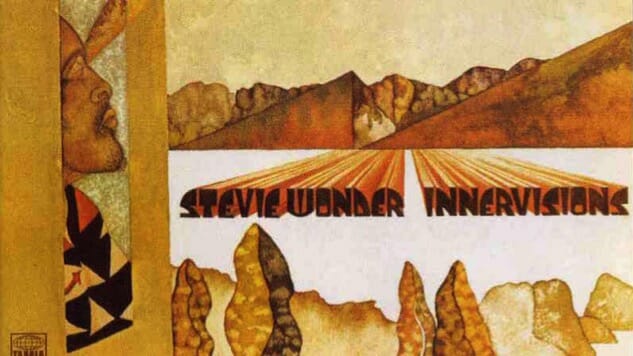
By the age of 23, Stevie Wonder had already released 15 studio albums. His 16th, Innervisions, dropped 43 years ago this month. But within days of its unveiling, on Aug. 6, Wonder was laying in a coma as a result of head trauma suffered in a car accident. It would be a while before he would even know the cultural and social impact of one of his and rock’s most enduring masterpieces.
The accident caused Wonder to cancel his tour promoting the album—he wouldn’t appear on stage until March of 1974 at Madison Square Garden as part of a originally planned 20-city tour that was canceled.
But the material on the album has been featured prominently on subsequent tours. And the Paste Vault has Wonder in peak form in 1984 in Detroit performing some of the album’s standouts, including the hit singles “Higher Ground” and “Living For the City.”
Tonto Synth inventor Malcolm Cecil worked with Wonder on the album, with the sound from that instrument becoming a staple in his post-Motown work. Innervisions was preceded by two other classics in Music of My Mind and Talking Book and followed by Fullfillingness’ First Finale and Songs in the Key of Life. Only Bob Dylan can claim a string of solo works that rival this output from Wonder, which spanned just five years. Cecil said of Innervisions: “I know it brought electronic instruments into the popular realm because of Stevie. I’m almost certain of it. For someone who is unsighted, he could paint a vivid picture with his words. He had remarkable vision and insight. He was a very talented guy. He was a genius arranger of music.”
But it’s not just the sound that Wonder created alone in the studio but the lyrics that set this album apart. They combine social awareness, protest, hope and spirituality. Here’s a key verse in “Living For The City”:
Her brother’s smart he’s got more sense than many
His patience’s long but soon he won’t have any
To find a job is like a haystack needle
‘Cause where he lives they don’t use colored people
Living just enough, just enough for the city
And here’s Wonder performing this classic at the Masonic Temple Theatre on April 14, 1984:
The spirituality of Wonder at such a young age but having already lived so much was fully realized on the album’s smash funk hit, “Higher Ground”:
I’m so glad that he let me try it again
‘Cause my last time on earth I lived a whole world of sin
I’m so glad that I know more than I knew then
Gonna keep on tryin’
Till I reach my highest ground
Lovers keep on lovin’
Believers keep on believin’
Sleepers just stop sleepin’
‘Cause it won’t be too long
Oh no
Fittingly, Wonder’s manager sang the song into Wonder’s ear when he was still in a coma and his prognosis and ability to function unknown. The accident was so bad he lost his sense of smell and suffered debilitating headaches for a year. After no response initially, Wonder began tapping his fingers to the music. It was the first sign of a recovery. “The only thing I know,” he’s quoted in Stevie Wonder: Musician, “is that I was unconscious, and that for a few days, I was definitely in a much better spiritual place that made me aware of a lot of things that concern my life and my future, and what I have to do to reach another higher ground.” He later told Crawdaddy, “What happened to me was a very, very critical thing, and I was really supposed to die.”
Here he is again from that same 1984 show, in a blistering version that features one of the most distinctive opening riffs in pop history.
Wonder’s range was on full exhibit in the Latin-infused “Don’t You Worry ‘bout a Thing,” which focused on accentuating the positive in a tumultuous time. And it was a time that Wonder did not shy away from in a fierce attack on Richard Nixon, “He’s Misstra Know-It-All.” But the joy of this song is conveyed so winningly in his performance, which can’t help but bring a smile to even the most world-weary face.
The last song from Innvervisions is more polarizing, with some critics like Robert Christgau calling it “immature” while AllMusic’s Matthew Greenwald ranked it among Wonder’s “finest ballad statements.” Wonder seems to cherish it in this introduction and performance, which features one of our greatest singers in his best voice.